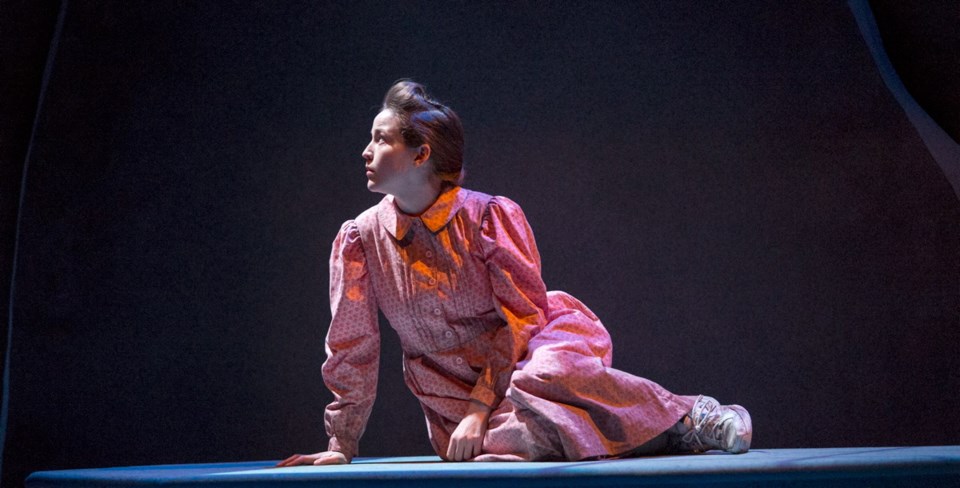REVIEW
What: Gracie
Where: Belfry Theatre
When: To Feb. 19
Rating: Three and a half stars (out of five)
The typical person’s view of the FLDS church is shaped by the headlines about leaders such as Warren Jeffs and Winston Blackmore.
Mostly, it’s the polygamy that gives the Fundamentalist Church of Jesus Christ of Latter-Day Saints a bad rap. The notion of multiple wives — some little older than children — just seems wrong (Jeffs is said to have had as many as 70 wives). And society frowns on single husbands siring dozens of kids.
Victoria playwright Joan MacLeod aims to provide a more complex and compassionate view of FLDS life in her play Gracie, which had its première Thursday at the Belfry Theatre. Despite being crafted with care, the 90-minute production is hampered by a lack of dramatic thrust. Still, devotees of this award-winning playwright likely won’t be disappointed — Thursday’s opening received a standing ovation.
In this one-woman drama, Lili Beaudoin plays Gracie, an eight-year-old compelled to abandon her Arizona/Utah-area home for a new religious community in Canada — presumably Bountiful, B.C. At the church’s command, her mother is sent there to marry Mr. Shelby, a much older man. This follows a forced split from her American husband.
We meet Gracie as a lively, likable child in a Prairie frock with puffy sleeves. We follow her to the age of 15. Over this time, Gracie grapples with vicissitudes of the FLDS existence. Yet, the girl is also able to sift out life’s small joys with a touching human resilience.
Upon the family’s arrival in Canada, one of Gracie’s sisters is promptly married off. Her brother, who rejects the community, is cast off, despite being ill-equipped to cope with the outside word. Meanwhile, Gracie’s mother must have more children with her new husband, in keeping with the FLDS belief that polygamy brings exaltation in heaven.
This production has its strengths. MacLeod approaches her subject with the same gentleness, thoughtfulness and humanity apparent in previous plays such as Amigo’s Blue Guitar and The Shape of a Girl.
Beaudoin conveys a young person’s joie de vivre with a lovely naturalness. Her portrayal of Grace as an eight-year-old is the one of the show’s great strengths. She sidesteps cutesiness — the biggest potential pitfall when an adult plays a child. Guided by the sure hand of director Vanessa Porteous, Beaudoin also plays a fistful of other characters, shifting from one to another with subtlety (although following who is who can be taxing).
Presumably to dodge ethnocentrism and didacticism, MacLeod avoids making Gracie a mouthpiece for those who dismiss such religious practices with black-and-white disapproval. Although Gracie ultimately takes a defiant stand, for the most part, she is accepting of her community’s way of life.
Opting for an empathetic viewpoint is laudable. Yet in dramatic terms it’s problematic. Gracie is often a passive observer, relating what’s happening in the lives of others. She tells us sister Celeste initially rebels against her imposed marriage, repeatedly running back home. We learn brother Billy is banished to a rundown trailer, eventually escapes, is rumoured to be prostituting himself in Vancouver and then returns covered in tattoos.
These characters, with their tumultuous lives, seem more interesting than Gracie. Making her the rebel might have been the audience-pleasing easy route. On the other hand, casting her as an ordinary person who is not particularly conflicted makes for a static plot.
Narda McCarroll’s lighting — although dark at times — is sensitive, particularly her deft use of softened spotlighting. Designer Catherine Hahn has created a striking abstract set reminiscent of Lawren Harris’s mountains and Georgia O’Keeffe’s multi-layered petals.


-thumb.png;w=120;h=80;mode=crop)
